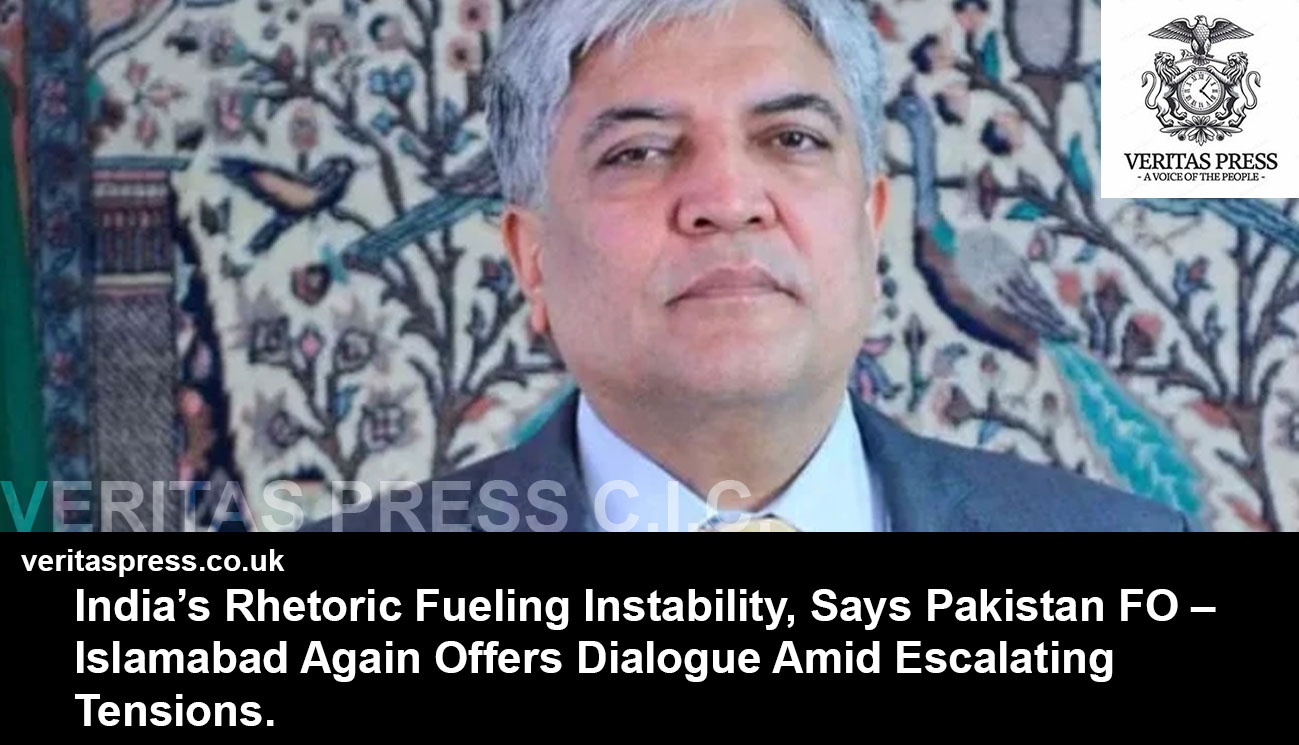Press Release: Veritas Press C.I.C.
Author: Kamran Faqir
Article Date Published: 02 Aug 2025 at 13:22 GMT
Category: South Asia | Pakistan |
Source(s): Veritas Press C.I.C. | Multi News Agencies
ISLAMABAD – Pakistan has once again rejected what it termed as “baseless and irresponsible” rhetoric emanating from Indian political leaders, warning that such jingoistic posturing threatens to destabilise an already volatile South Asian region. The latest condemnation follows Indian parliamentary references to the so-called “Operation Sindoor,” which Pakistan dismissed as a fabrication designed to deflect attention from India’s internal failures and aggressive regional posture.
At a weekly press briefing on Friday, Foreign Office Spokesperson Ambassador Shafqat Ali Khan delivered a stern rebuke to the recent statements made in the Indian Lok Sabha, underscoring that Pakistan will not be intimidated by war-mongering narratives and is prepared to defend its sovereignty at all costs.
“The world knows that India carried out attacks on Pakistani territory without a shred of credible evidence,” Khan said. “The so-called strikes on alleged terrorist sites led to the martyrdom of innocent civilians. India failed to avail itself of Pakistan’s immediate offer for a joint investigation into the Pahalgam incident, which speaks volumes about the falsity of their claims.”
Rising Tensions After Pahalgam Attack:
The diplomatic row between the two nuclear-armed rivals has deepened since the April 22 Pahalgam attack in Indian Illegally Occupied Jammu and Kashmir (IIOJK), where 26 Indian and foreign tourists were killed. India swiftly blamed Pakistan without presenting any credible evidence, prompting Islamabad to issue strong denials and offer an impartial, third-party probe, an offer New Delhi rejected.
Following the incident, India launched an unprovoked air strike on May 7, targeting what it alleged were terrorist hideouts in Pakistan. In reality, the attack hit civilian areas, killing several non-combatants, according to Pakistani officials.
In response, the Pakistan Air Force (PAF) conducted a counter-strike, shooting down at least six Indian Air Force jets, including three French-made Rafale aircraft. The tit-for-tat military escalations continued through May 9–10, when India struck Pakistani military sites, prompting Islamabad to launch Operation Bunyanum Marsoos, targeting Indian missile storage facilities, airbases, and strategic command posts.
Ceasefire Amid Diplomatic Intervention:
The conflict reached a dangerous high before US President Donald Trump brokered a ceasefire on May 10, after overnight negotiations involving regional and international diplomats. Troop withdrawals from the Line of Control and the international border followed in the weeks ahead, yet a fragile calm continues to prevail.
Despite the ceasefire, Indian leaders, including senior ministers, have continued to make inflammatory remarks, which Islamabad views as attempts to score domestic political points at the cost of regional peace.
India’s Remarks On The Indus Waters Treaty Dismissed:
In the same press briefing, Ambassador Khan also condemned the Indian Home Minister’s recent threats regarding the Indus Waters Treaty (IWT), a World Bank-brokered agreement dating back to 1960 that governs the distribution of water from the Indus River system.
“Displaced assertions by Indian officials carry no legal weight and cannot alter established international treaties,” Khan said, reiterating that any unilateral attempts to divert Pakistan’s water share would be seen as an act of aggression.
Pakistan’s Deputy Prime Minister and Foreign Minister, Ishaq Dar, echoed this stance during a press conference in New York earlier this week, warning that Islamabad will not tolerate any breach of the IWT, which he called a “binding, inviolable treaty.”
Renewed Offer For Dialogue:
In a notable shift from military confrontation to diplomatic overtures, Dar also reaffirmed Pakistan’s willingness to engage in composite dialogue with India, provided talks are based on mutual respect and international law.
“The dialogue cannot be limited to terrorism alone,” Dar said, pointing out that Pakistan has been among the biggest victims of terrorism, particularly from cross-border attacks by groups like the TTP and BLA, which Islamabad alleges receive foreign funding and safe haven from across its borders.
He further noted that during a bilateral meeting with US Secretary of State Marco Rubio, Pakistan’s concerns over state-sponsored terrorism and the Kashmir dispute were raised. According to Dar, Rubio acknowledged Pakistan’s sacrifices in the global war on terror.
The foreign minister stressed that permanent peace in South Asia is impossible without a just resolution of the Jammu and Kashmir conflict, calling for international mediation and referencing past remarks by Trump, who had publicly offered to mediate the Kashmir issue during his first term in office.
Palestine And Pakistan’s Diplomatic Posture:
On the broader international front, Dar reaffirmed Pakistan’s strong position on the Palestinian issue, ruling out any recognition of Israel and calling for an immediate ceasefire in Gaza, where humanitarian conditions continue to deteriorate amid ongoing Israeli bombardment.
“Pakistan will continue to support the establishment of a sovereign Palestinian state, with Al-Quds Al-Sharif as its capital,” Dar said.
He also described his US visit as a diplomatic success, having used the platform to raise Pakistan’s voice for UN Security Council reforms and greater OIC representation in global decision-making institutions.
Regional Peace At A Crossroads:
With tensions still simmering and the fragile ceasefire holding, the region remains on edge. Pakistani officials are warning that India’s escalating rhetoric, particularly in domestic political forums like the Lok Sabha, serves only to inflame nationalist sentiment and threaten regional stability.
“India’s continued reliance on chest-thumping nationalism and false flag operations is a dangerous game,” said Ambassador Khan. “The only viable path forward is a commitment to international norms, bilateral dialogue, and respect for sovereignty.”
While Pakistan maintains its defence preparedness, the repeated offers of dialogue from Islamabad present an opportunity for de-escalation. The question remains whether New Delhi, under mounting international scrutiny, will reciprocate or continue down a path of confrontation.
Tags:




























Leave a Reply